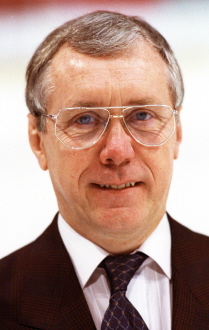
The Ice Hockey World Championships are an annual international men's ice hockey tournament organized by the International Ice Hockey Federation (IIHF). First officially held at the 1920 Summer Olympics. The IIHF was created in 1908 while the European Championships, the precursor to the World Championships, were first held in 1910. The tournament held at the 1920 Summer Olympics is recognized as the first Ice Hockey World Championship. From 1920 to 1968, the Olympic hockey tournament was also considered the World Championship for that year.
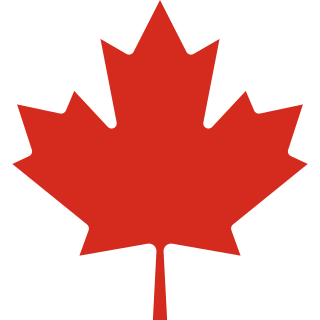
The Canada men's national ice hockey team is the ice hockey team representing Canada internationally. The team is overseen by Hockey Canada, a member of the International Ice Hockey Federation. From 1920 until 1963, Canada's international representation was by senior amateur club teams. Canada's national men's team was founded in 1963 by Father David Bauer as a part of the Canadian Amateur Hockey Association, playing out of the University of British Columbia. The nickname "Team Canada" was first used for the 1972 Summit Series and has been frequently used to refer to both the Canadian national men's and women's teams ever since.

The Sweden men's national ice hockey team is governed by the Swedish Ice Hockey Association. It is one of the most successful national ice hockey teams in the world and a member of the so-called "Big Six", the unofficial group of the six strongest men's ice hockey nations, along with Canada, the Czech Republic, Finland, Russia and the United States.

The Czech Republic men's national ice hockey team is the national ice hockey team of the Czech Republic. Since 2021, the team has been officially known in English as Czechia. It is one of the most successful national ice hockey teams in the world and a member of the so-called "Big Six", the unofficial group of the six strongest men's ice hockey nations, along with Canada, Finland, Russia, Sweden and the United States. It is governed by the Czech Ice Hockey Association. The Czech Republic has 85,000 male players officially enrolled in organized hockey.

The Russian men's national ice hockey team is the national men's ice hockey team of Russia, overseen by the Ice Hockey Federation of Russia. As of 2021, they were rated third in the IIHF World Ranking. The team has competed internationally from 1992 until a 2022 ban, and is recognized by the IIHF as the successor to the Soviet Union team and CIS team. Russia has been one of the most successful national ice hockey teams in the world and a member of the so-called "Big Six," the unofficial group of the six strongest men's ice hockey nations, along with Canada, the Czech Republic, Finland, Sweden, and the United States. The European nations of the Big Six participate in the Euro Hockey Tour, which Russia won nine times since 2005. Since September 2021, the head coach is Alexei Zhamnov, who took over from Valeri Bragin.
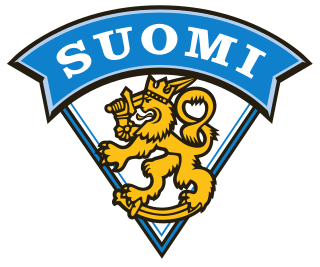
The Finnish men's national ice hockey team, nicknamed Leijonat / Lejonen, is governed by the Finnish Ice Hockey Association. Finland is one of the most successful national ice hockey teams in the world and a member of the so-called "Big Six", the unofficial group of the six strongest men's ice hockey nations, along with Canada, the United States, the Czech Republic, Russia, and Sweden.

The German men's national ice hockey team is the national ice hockey team of Germany and is controlled by the German Ice Hockey Federation. It first participated in serious international competition at the 1911 European Hockey Championship. When Germany was split after World War II, a separate East Germany national ice hockey team existed until 1990. By 1991, the West and East German teams and players were merged into the United German team. The team's head coach is Toni Söderholm.

The United States women's national ice hockey team is controlled by USA Hockey. The U.S. has been one of the most successful women's ice hockey teams in international play, having medaled in every major tournament.

The Swedish women's national ice hockey team or Damkronorna represents Sweden at the International Ice Hockey Federation's IIHF World Women's Championships. The women's national team is organized by the Swedish Ice Hockey Association. Sweden had 3,425 female players registered with the IIHF in 2011.

Ice hockey tournaments have been staged at the Olympic Games since 1920. The men's tournament was introduced at the 1920 Summer Olympics and was transferred permanently to the Winter Olympic Games program in 1924, in France. The women's tournament was first held at the 1998 Winter Olympics.
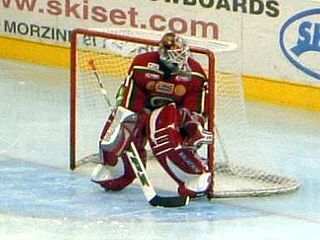
Tommy Mikael Salo is a Swedish former professional ice hockey goaltender and the current general manager of Leksands IF of the Swedish Hockey League (SHL). He previously played in the National Hockey League (NHL) for the New York Islanders, Edmonton Oilers and Colorado Avalanche, and previously served as head coach of IK Oskarshamn.

Ulf Peter Jörgen Jönsson is a Swedish former professional ice hockey player who last played for Färjestads BK of the Swedish Elitserien. He has represented the Team Sweden 285 times, making him the record holder for most games played in the national team. Jörgen Jönsson is also the older brother of former NHL-star Kenny Jönsson, and the two played 68 games in North America together as teammates. Jönsson was inducted into the IIHF Hall of Fame in 2019.

Bengt-Åke Gustafsson is a Swedish ice hockey coach and former ice hockey player. Gustafsson is a former head coach of the Sweden men's national ice hockey team, a post he held from February 2005 to May 2010.
Johan Kjell Garpenlöv is a Swedish former ice hockey left winger and ice hockey coach. He also starred for several years in his native Sweden. He was drafted in the fifth round, 85th overall, by the Detroit Red Wings in the 1986 NHL Entry Draft.

Lars Gunnar Raldo "Lasse" Björn is a Swedish former ice hockey defenceman who played 217 games for the national team Tre Kronor. He was born in Stockholm, Sweden. He won nine Swedish ice hockey championships with Djurgårdens IF between 1950 and 1963, making him the only player ever to have won that many championships. He participated at nine IIHF World Championship tournaments, winning gold in 1953 and 1957 and three bronze medals. He participated in three Winter Olympics, winning one bronze medal in 1952. He was inducted into the International Ice Hockey Federation Hall of Fame in 1998.
Louis Joseph Vairo is an American retired ice hockey coach and administrator. He served as head coach of the United States men's junior team at five IIHF World U20 Championships, and the United States men's team at four Ice Hockey World Championships and the 1984 Winter Olympics. He was an advance scout for the United States gold medal team at the 1980 Winter Olympics, and was an assistant coach on the United States silver medal team at the 2002 Winter Olympics. He has also served as head coach of the Netherlands men's team and the Italy men's team at the Ice Hockey World Championships. Vairo has coached in professional hockey leagues in Europe, won a Serie A championship with HC Milano Saima, and served as an assistant coach for the New Jersey Devils. In junior ice hockey, he won five Metropolitan Junior Hockey League championships and the New York State junior championship, and coached the Austin Mavericks to two Midwest Junior Hockey League championships and one national championship.
Hanna-Riikka Sallinen is a Finnish retired ice hockey, bandy, rinkball, and pesäpallo player. She is one of the most highly decorated players to have ever competed in international ice hockey.

Ice hockey in Sweden has a history going back to at least 1912 and is one of the country's most popular sports. The sport was first organized in the country by the Swedish Football Association (SvFF), which was a member of the IIHF in 1912. The ice hockey department of the SvFF eventually split off to become the Swedish Ice Hockey Association (SIHA) which today is still responsible for organizing Sweden's domestic leagues and its participation in tournaments internationally. The highest tier of men's ice hockey in Sweden, the SHL, brought in 1,974,388 spectators in the 2013–14 season, the highest overall attendance in Swedish sports. The SHL's average of 5,983 spectators per match is bested only by Allsvenskan, the country's top flight of association football.
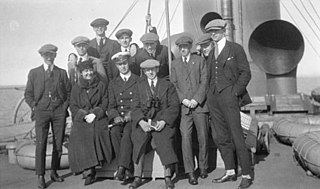
The 1920 Summer Olympics ice hockey rosters consisted of 60 players on 7 national ice hockey teams. Played at the Olympic Games for the first time, and later regarded by the International Ice Hockey Federation (IIHF) as the first World Championship. Teams were required to be strictly amateur, so players from the Canadian-based National Hockey League (NHL) or other professional leagues were excluded. Canada sent the Winnipeg Falcons, who had won the 1920 Allan Cup, the amateur championship in Canada.
Zoltán Kovács is a Hungarian ice hockey coach and administrator. He joined the Hungarian Ice Hockey Federation as a secretary in 1994, then served as its general secretary from 1998 to 2017, and has served as its vice-president since 2017. He played for the Hungary men's national junior ice hockey team in 1980, and was its manager in 2003 when the team earned promotion to Division I of the IIHF World U20 Championship. He played professionally for Ferencvárosi TC, and sat on several International Ice Hockey Federation (IIHF) committees. The IIHF named Kovács as the 2020 Paul Loicq Award recipient, for his contributions to the IIHF and international hockey.
